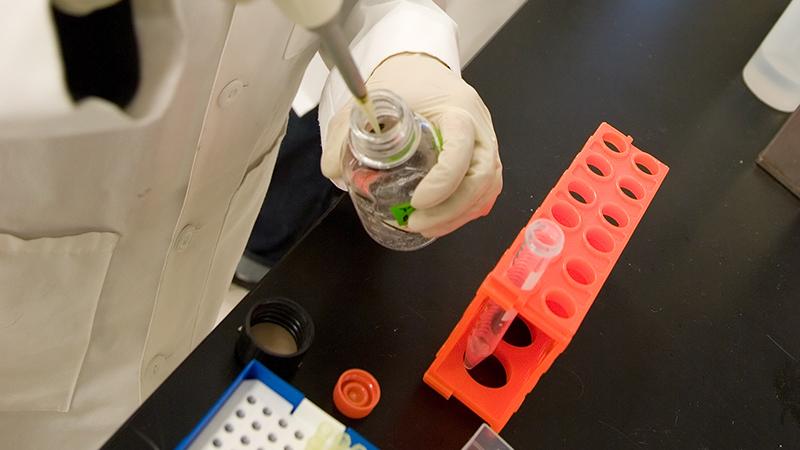September 15, 2016

Marta Manning earned her doctorate in chemistry. But as part of her program, she also studied aspects of engineering, learned about commercial issues like intellectual property and conflict resolution, and mapped her academic path with biologists and chemical engineers, as well as chemists. After graduating from Rensselaer Polytechnic Institute, Manning founded Promatrix Technologies, a company that is developing a diagnostic blood test for bipolar disorder based on proteomics.
Manning took part in the Biomolecular Sciences and Engineering Training Program, which offers doctoral students opportunities outside their specific field of study, preparing them to cross boundaries in their careers, whether in academia, industry, or as entrepreneurs. With support from the National Institutes of General Medical Sciences (NIGMS) within the National Institutes of Health (NIH), Rensselaer has hosted the program since 2004, in a collaboration first with the New York State Department of Health Wadsworth Center, and currently with the University at Albany.
Now, a $1.8 million grant from the NIH will expand the program to serve more students, said Deepak Vashishth, director of the NIGMS training program at Rensselaer, and director of the Rensselaer Center for Biotechnology and Interdisciplinary Studies.
“The goal of this program is to blur the boundary at the interface between the life sciences and engineering, and prepare our students for the career of their choice, whether in academia, industry, or as entrepreneurs,” said Vashishth. “It’s a rigorous, well-designed program, and it offers multiple advantages to our students.”
The program includes a series of required courses, biotechnology research seminars and research retreats, and multidisciplinary advising drawing on faculty from Rensselaer and University at Albany, as well as an industry internship. Required courses in life sciences, biotechnology, data science, and entrepreneurship ensure that students build knowledge outside of their field of study spanning synthetic biology and biomanufacturing, regenerative engineering and biotherapeutics, or computational biology and bioinformatics. Multidisciplinary advising provides a network of perspectives from experts along the entire spectrum connecting life sciences and engineering. An annual research retreat in biomolecular science and engineering is an additional opportunity for networking. And an internship provides real-world experience in an industrial research laboratory.
The NIH grant has enabled Rensselaer to develop courses and resources that comprise the program, as well as paying tuition and providing a stipend for supported students, nearly 20 percent of whom are underrepresented minorities or students with disabilities. The NIH grant combined with additional Rensselaer funding supports nine doctoral students per year for five years.
Additionally, the training program offers an opportunity for all doctoral students at Rensselaer to earn a certificate in biomolecular science and engineering, by fulfilling the program requirements. Interested students can enroll in the certificate program, fulfill the course work, and attend seminars and other research opportunities to earn the certificate.
“There are so many aspects of the program – the interdisciplinary research and training in biotechnology, the emphasis on data science and entrepreneurship, the academic and career advising – that are an enormous benefit for students,” said Vashishth.
At Rensselaer, this program is enabled by the vision of The New Polytechnic, an emerging paradigm for higher education which recognizes that global challenges and opportunities are so great they cannot be adequately addressed by even the most talented person working alone. Rensselaer serves as a crossroads for collaboration—working with partners across disciplines, sectors, and geographic regions—to address complex global challenges, using the most advanced tools and technologies, many of which are developed at Rensselaer. Research at Rensselaer addresses some of the world’s most pressing technological challenges—from energy security and sustainable development to biotechnology and human health. The New Polytechnic is transformative in the global impact of research, in its innovative pedagogy, and in the lives of students at Rensselaer.
About Rensselaer Polytechnic Institute
Rensselaer Polytechnic Institute, founded in 1824, is America’s first technological research university. The university offers bachelor’s, master’s, and doctoral degrees in engineering; the sciences; information technology and web sciences; architecture; management; and the arts, humanities, and social sciences. Rensselaer faculty advance research in a wide range of fields, with an emphasis on biotechnology, nanotechnology, computational science and engineering, data science, and the media arts and technology. The Institute has an established record of success in the transfer of technology from the laboratory to the marketplace, fulfilling its founding mission of applying science “to the common purposes of life.” For more information, please visit http://www.rpi.edu.